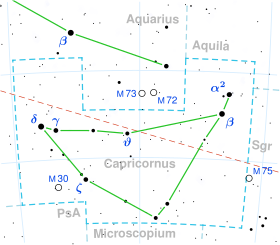Xi1 Capricorni
Appearance
| Observation data Epoch J2000.0 Equinox J2000.0 (ICRS) | |
|---|---|
| Constellation | Capricornus |
| Right ascension | 20h 11m 57.89778s[1] |
| Declination | −12° 23′ 32.6484″[1] |
| Apparent magnitude (V) | +6.34[2] |
| Characteristics | |
| Spectral type | K0 III[3] |
| B−V color index | +1.21[2] |
| Astrometry | |
| Radial velocity (Rv) | +0.9[4] km/s |
| Proper motion (μ) | RA: −8.004[1] mas/yr Dec.: −18.202[1] mas/yr |
| Parallax (π) | 5.2607 ± 0.0577 mas[1] |
| Distance | 620 ± 7 ly (190 ± 2 pc) |
| Absolute magnitude (MV) | +0.56[5] |
| Details | |
| Mass | 1.55[6] M☉ |
| Radius | 18.88+0.72 −0.95[1] R☉ |
| Luminosity | 139±2[1] L☉ |
| Temperature | 4,439±42[6] K |
| Age | 3.35[6] Gyr |
| Other designations | |
| Database references | |
| SIMBAD | data |
Xi1 Capricorni, Latinized from ξ1 Capricorni, is an orange-hued star in the constellation Capricornus. With an apparent visual magnitude of +6.34,[2] it is near the lower limit of brightness for stars that can be seen with the naked eye. Based upon an annual parallax shift of 5.26 mas as seen from Earth,[1] this system is located roughly 620 light-years from the Sun.
It is an evolved K-type giant star with a stellar classification of K0 III.[3] With an age of 3.35 billion years, this star has an estimated 1.55[6] times the mass of the Sun and is radiating 139[1] times the Sun's luminosity from its enlarged photosphere at an effective temperature of about 4,439 K.[6]
References
[edit]- ^ a b c d e f g h i Brown, A. G. A.; et al. (Gaia collaboration) (August 2018). "Gaia Data Release 2: Summary of the contents and survey properties". Astronomy & Astrophysics. 616. A1. arXiv:1804.09365. Bibcode:2018A&A...616A...1G. doi:10.1051/0004-6361/201833051. Gaia DR2 record for this source at VizieR.
- ^ a b c Corben, P. M.; Stoy, R. H. (1968), "Photoelectric Magnitudes and Colours for Bright Southern Stars", Monthly Notes of the Astronomical Society of Southern Africa, 27: 11, Bibcode:1968MNSSA..27...11C.
- ^ a b Houk, Nancy; Smith-Moore, M. (1978), Michigan catalogue of two-dimensional spectral types for the HD stars, vol. 4, Ann Arbor: Dept. of Astronomy, University of Michigan, Bibcode:1988mcts.book.....H.
- ^ Wilson, R. E. (1953), General Catalogue of Stellar Radial Velocities, Carnegie Institution for Science, Bibcode:1953GCRV..C......0W, LCCN 54001336.
- ^ Anderson, E.; Francis, Ch. (2012), "XHIP: An extended hipparcos compilation", Astronomy Letters, 38 (5): 331, arXiv:1108.4971, Bibcode:2012AstL...38..331A, doi:10.1134/S1063773712050015, S2CID 119257644.
- ^ a b c d e Luck, R. Earle (September 2015), "Abundances in the Local Region. I. G and K Giants", The Astronomical Journal, 150 (3): 23, arXiv:1507.01466, Bibcode:2015AJ....150...88L, doi:10.1088/0004-6256/150/3/88, S2CID 118505114, 88.
- ^ "ksi01 Cap". SIMBAD. Centre de données astronomiques de Strasbourg. Retrieved 2017-08-31.

